2023届高三英语二轮复习 八大时态课件-(共43张PPT)
文档属性
| 名称 | 2023届高三英语二轮复习 八大时态课件-(共43张PPT) | 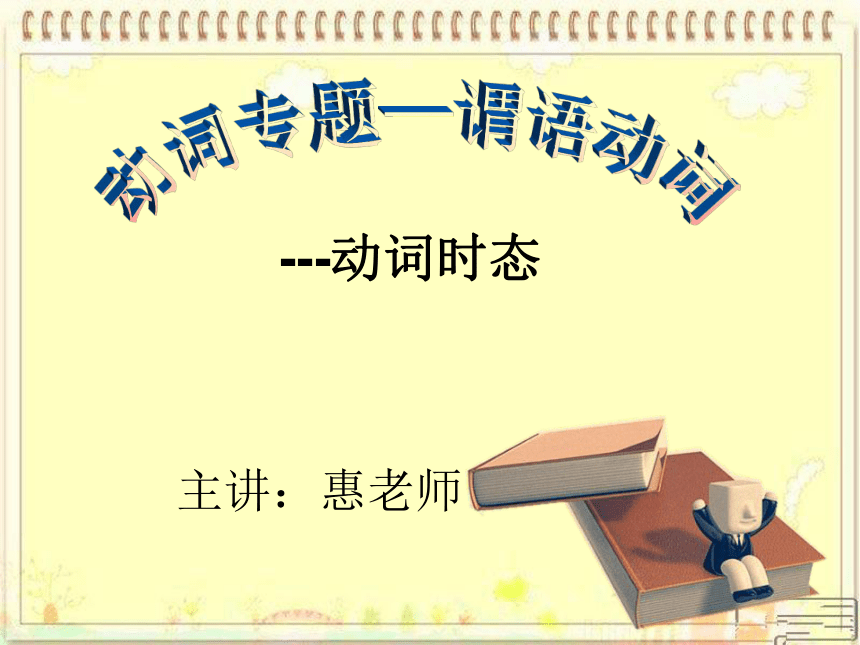 | |
| 格式 | pptx | ||
| 文件大小 | 570.6KB | ||
| 资源类型 | 教案 | ||
| 版本资源 | 通用版 | ||
| 科目 | 英语 | ||
| 更新时间 | 2022-11-02 10:05:48 | ||
图片预览

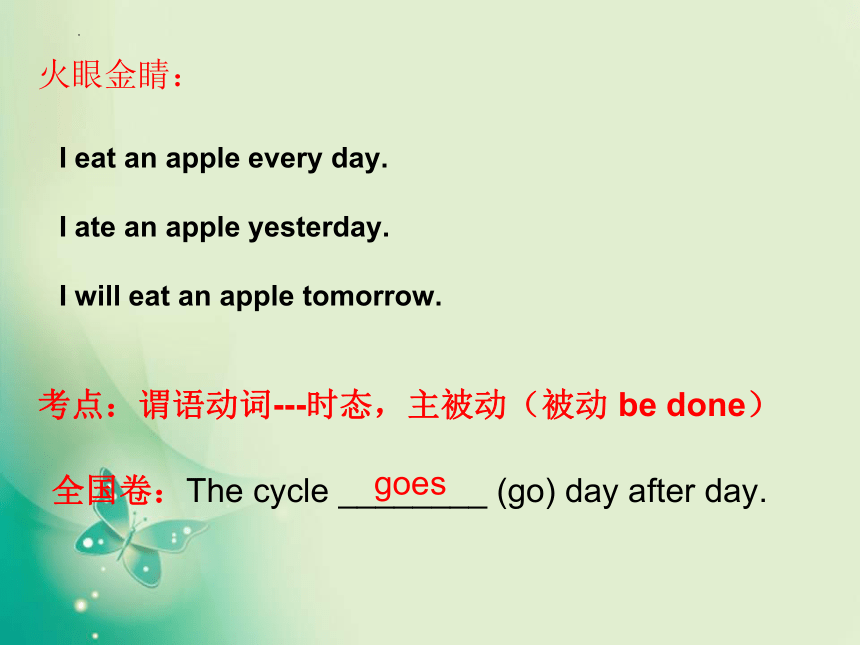
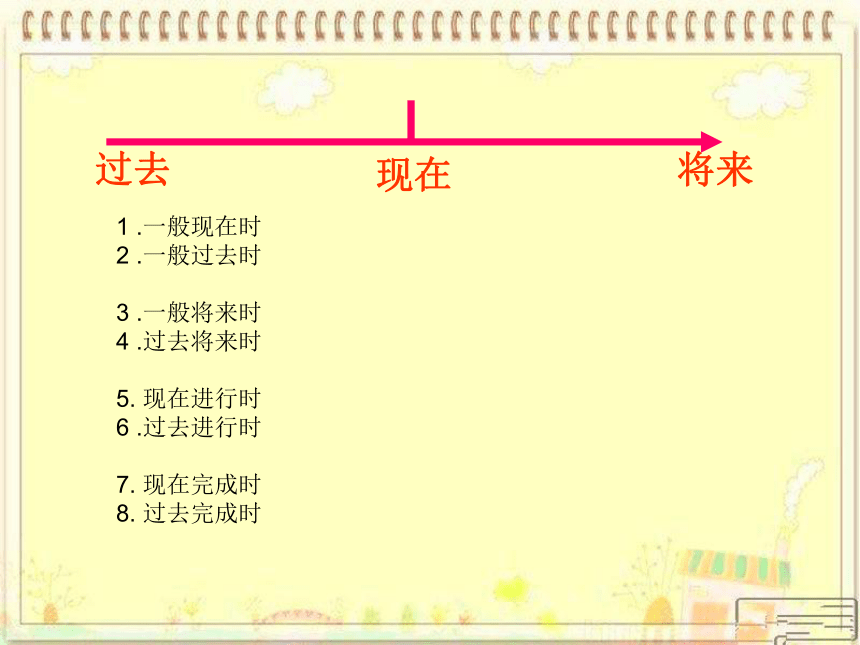
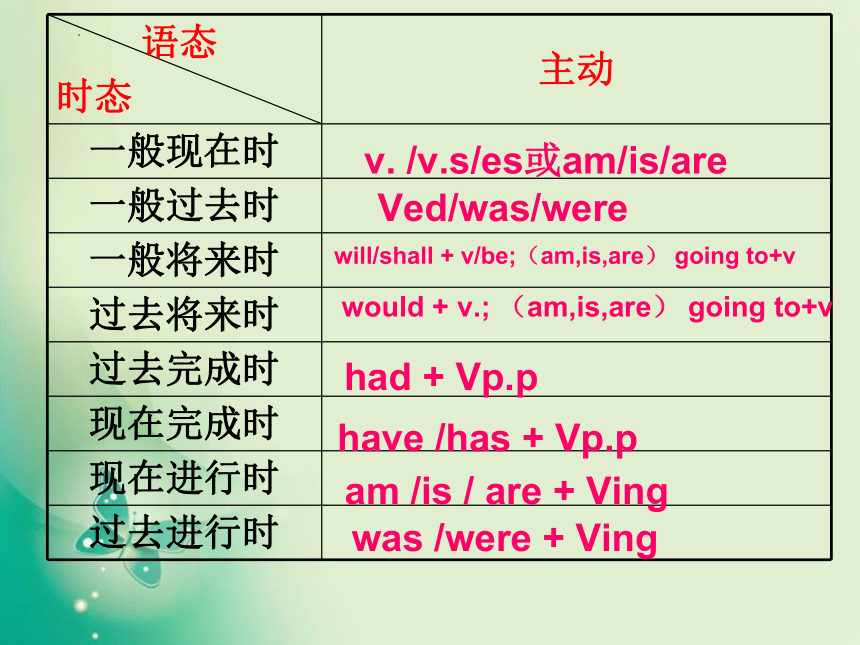

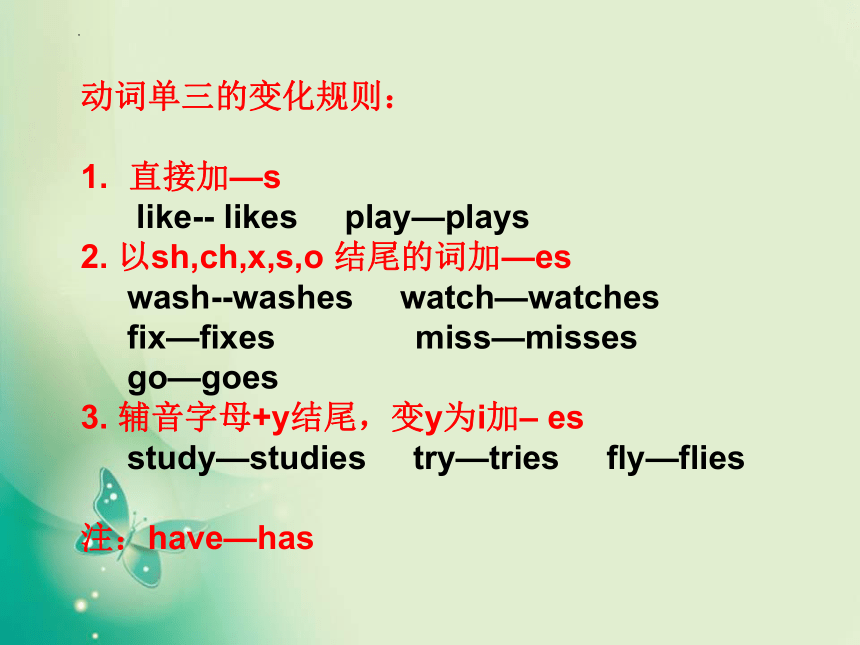
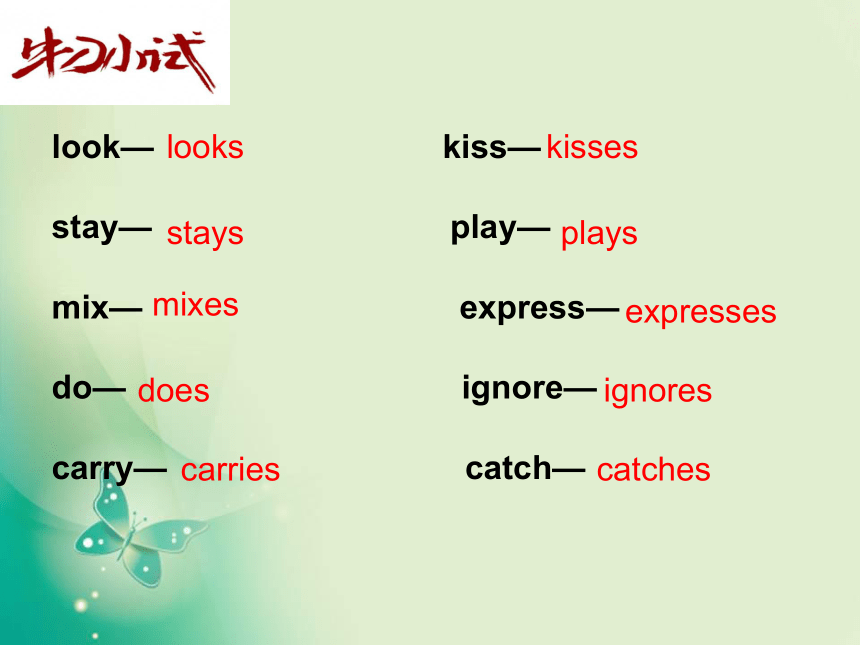
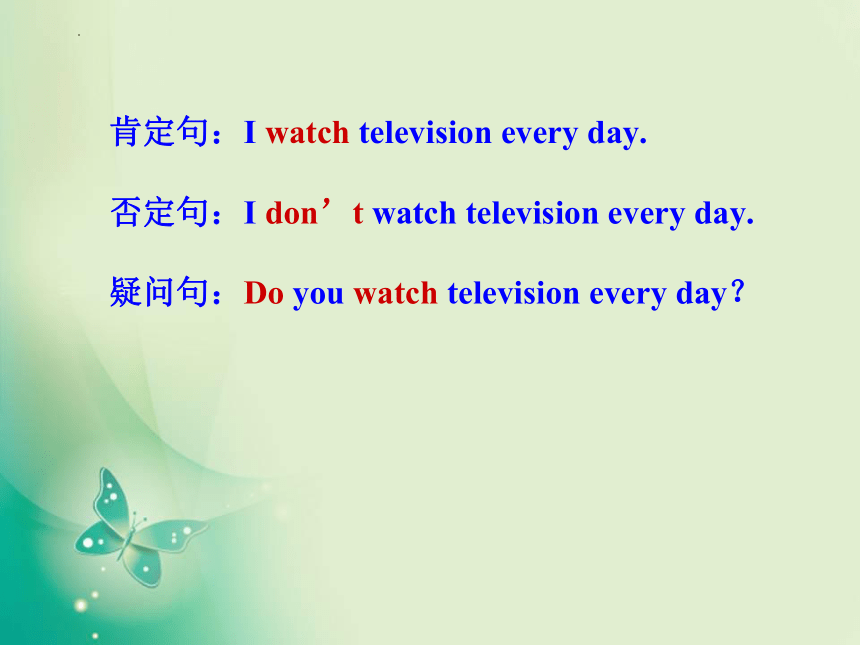
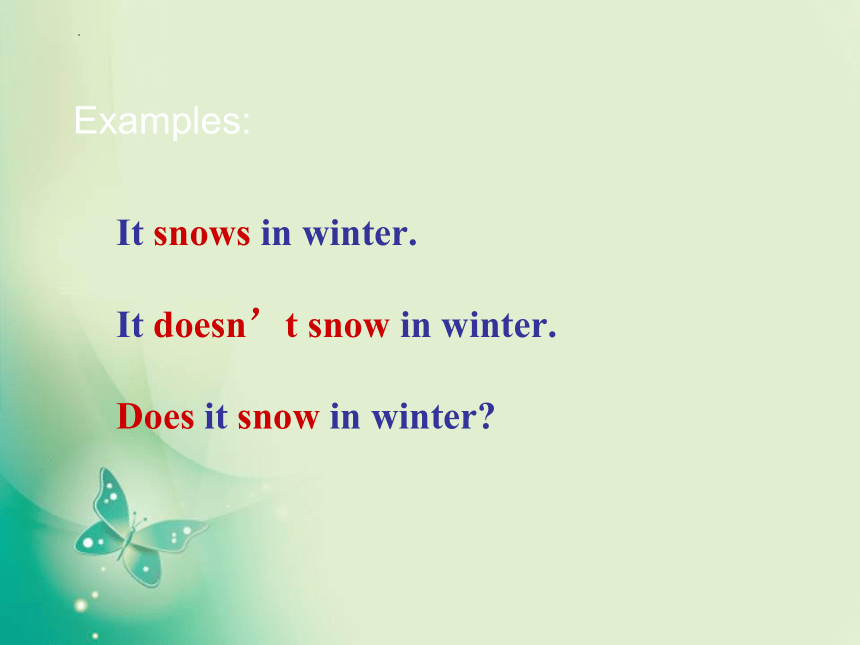

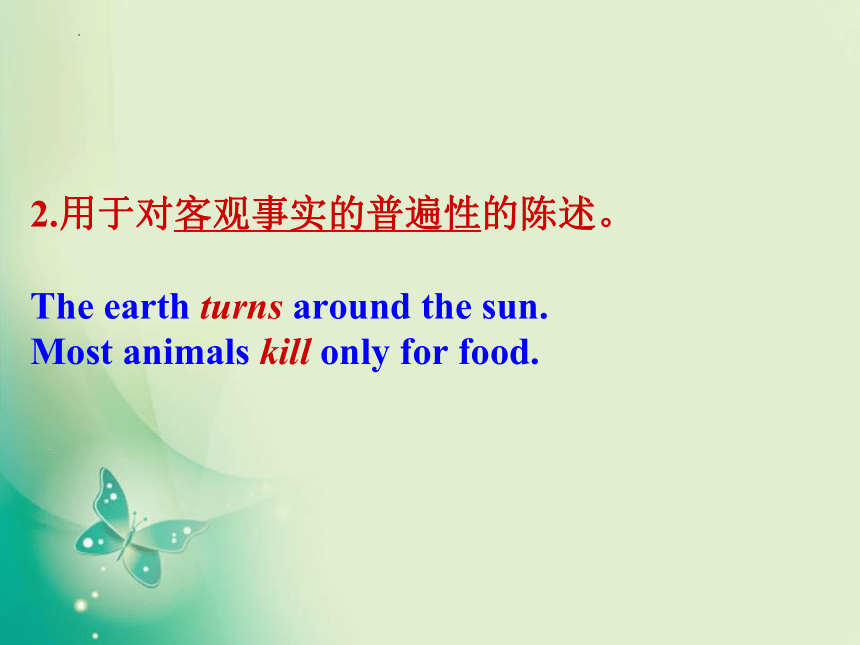
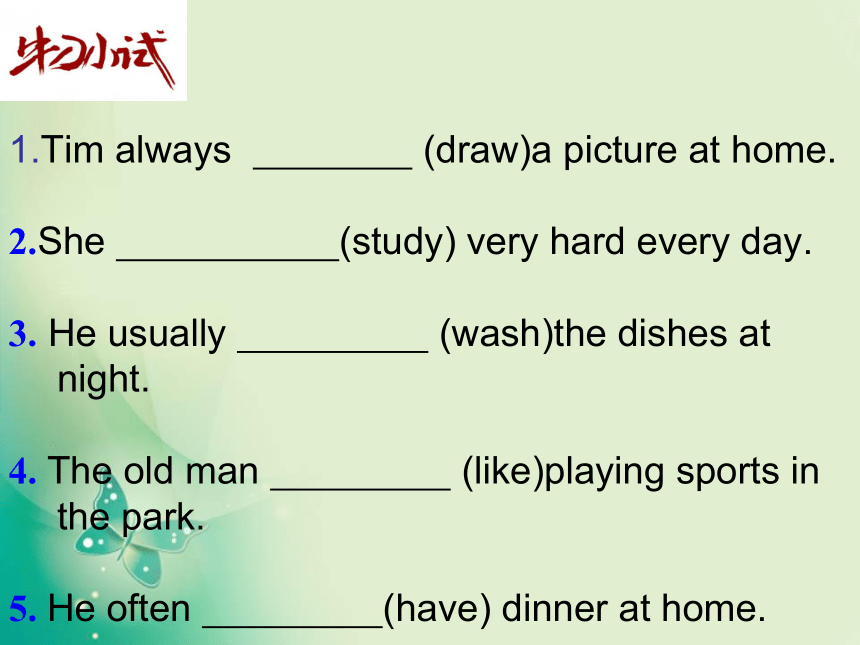
文档简介
(共43张PPT)
动词专题—谓语动词
---动词时态
主讲:惠老师
I eat an apple every day.
I ate an apple yesterday.
I will eat an apple tomorrow.
火眼金睛:
考点:谓语动词---时态,主被动(被动 be done)
全国卷:The cycle ________ (go) day after day.
goes
1 .一般现在时
2 .一般过去时
3 .一般将来时
4 .过去将来时
5. 现在进行时
6 .过去进行时
7. 现在完成时
8. 过去完成时
现在
过去
将来
语态 时态 主动
一般现在时
一般过去时
一般将来时
过去将来时
过去完成时
现在完成时
现在进行时
过去进行时
v. /v.s/es或am/is/are
Ved/was/were
will/shall + v/be;(am,is,are) going to+v
would + v.; (am,is,are) going to+v
had + Vp.p
have /has + Vp.p
am /is / are + Ving
was /were + Ving
用法: 现阶段经常性和习惯性的动作;客观事实;科学真理。
常用时间状语 :
usually, sometimes, in spring, every day, in the morning
动词结构:
1.be (am;is ;are)
2.动词原形/动词单三(do/does) she/he/it/名词单数 + 动词单三
一般现在时
例句:
We are grateful for your help.
I usually go to the park.
3. She often goes swimming in summer.
动词单三的变化规则:
直接加—s
like-- likes play—plays
2. 以sh,ch,x,s,o 结尾的词加—es
wash--washes watch—watches
fix—fixes miss—misses
go—goes
3. 辅音字母+y结尾,变y为i加– es
study—studies try—tries fly—flies
注:have—has
look— kiss—
stay— play—
mix— express—
do— ignore—
carry— catch—
looks
stays
mixes
does
carries
kisses
plays
expresses
ignores
catches
肯定句:I watch television every day.
否定句:I don’t watch television every day.
疑问句:Do you watch television every day?
It snows in winter.
It doesn’t snow in winter.
Does it snow in winter
Examples:
一般现在时的使用:
1.一般现在时表示总是、通常、习惯性的动作或状态。
It snows in winter.
I watch television every day.
2.用于对客观事实的普遍性的陈述。
The earth turns around the sun.
Most animals kill only for food.
1.Tim always (draw)a picture at home.
2.She (study) very hard every day.
3. He usually (wash)the dishes at night.
4. The old man (like)playing sports in the park.
5. He often (have) dinner at home.
高考真题链接:
1.the review says it (be) more effective at
lengthening life than walking, cycling or swimming.
2. Fast food (be) full of fat and salt.
3. But at the moment, school (come) first. I
don’t want to put too much in modeling.
is
is
comes
用法:过去时间发生的或过去经常性的动作。
常用时间状语:
yesterday, last night, two days ago, in 2000, at that time,
just now
动词构成:1.be (was/were)
2.动词过去时(--ed)
listen—listened am/is—was
study---studied are—were
stop-----stopped come—came
一般过去时
情况 构词方法 例词
一般情况 加-ed want→wanted
以辅音字母+y结尾 变y为i加-ed study→studied
以字母-e结尾 加-d live→lived
以重读闭音节结尾,末尾只有一个辅音字母 末尾字母双写再加-ed stop→stopped
beg—begged
drop—dropped
plan—planned
动词过去式的规则变化:
动词不规则变化:
一、AAA型(原形→原形→原形) cut—cut—cut 切;割;砍
二、ABA型(原形→过去式→原形) become—became—become 变成
三、ABC型 grow—grew—grown 生长,成长
四、ABB型 buy—bought—bought 买
五、AAB型 beat—beat—beaten 击败
六、有两种形式 learn—learned/learnt—learned/learnt 学习
否定构成:didn’t+动原
一般疑问构成及简答举例:Did+主语+动原+其它?
特殊疑问句举例:What did he do yesterday
When did he get up this morning
I often got up at 6:00 last year.
I didn’t walk to school yesterday.
Did you walk to school yesterday
I walked to school yesterday.
I bought a new car three days ago.
1. Last week, we___________ (pick) many apples on the farm.
2. A week ago, Kitty and Ben________________(be) in Guangzhou.
3. Last year Mr. Smith____________ (go) to China and Japan.
4. He__________________(not find) his key last night.
5. He________________(be) here just now.
6. _______you__________ (finish) your homework yesterday
7. Mary______________(read) English yesterday morning.
8. What__________ (make) him cry (哭) just now
picked
were
went
didn’t
was
Did
finish
read
made
高考真题链接:
In 1969,the pollution was terrible along the Cuyahoga River Cleveland, Ohio. It (be) unimaginable that it could ever be cleaned up.
2. anyone lose a suitcase at the last stop?
3.He was cooking some delicious food in the kitchen .Suddenly, he (find)that he had run out of salt.
was
Did
found
用法:将来会出现或发生的动作或状态。
常用时间状语:tomorrow, next month,
in a few minutes, in two days, in the future
动词构成: 1. will/shall+动原
2.am/is/are going to+动词原型(计划,打算)
以work为例:will/shall work am/is/are going to work
一般将来时
否定构成:will/shall not…
am/is/are not…
特殊疑问句举例:What will you do tomorrow
When are we going to have a class meeting
1. Today is a sunny day. We (have) a picnic this afternoon.
2. My brother (go) to Shanghai next week.
3. Tom often (go) to school on foot. But today is raining. He (go) to school by bike.
4. Mary (visit) her grandparents tomorrow.
5. David (give) a puppet show next Monday.
Will have
will go
goes
is going to go/will go
will visit
will give
用法:从过去某时间来看将要发生的动作或状态,
常用于宾从句.
动词构成: 1、would/should+动原
2、 was/were going to+动原
以work为例:would/should work
was/were going to work
过去将来时
否定构成:would/should not…
was/were not…
一般疑问构成:常用if或whether引导宾从
特殊疑问句举例:He asked what they would do the next week.
I thought I would make lots of newfriends.
They said that they were going to spend the vacation together.
A: Where did you go
B: I was going to visit the park, but in the end I went to the free market.
A: What was it like
B:I thought it would be busy, but it was very quiet.
用法:说话时正在进行的动作或当前一段时间一直进行的动作
常用时间状语 :now,these days
现在进行时中动词形式:
am
is + (现在分词) v - ing
are
V-ing 的变化规则:
1、直接加 ing do-doing
2、以不发音的e结尾,去e 加ing live-living
3、辅元辅结尾的重读闭音节 sit-sitting drop-dropping
4.以 ie 结尾 die-dying lie-lying tie-tying
现在进行时
John and Mary are talking on the phone.
John and Mary are not talking on the
Phone.
Are John and Mary talking on the phone
She is writing another book this year.
I am watching a TV series these days.
1.Diane ____ (wash) her hair every other day or so.
2.Kathy usually (sit) ____ in the front row during class,but now she (sit)in the last row.
用法:过去某一时刻或某一段时间内正在或一直发生 的动作
常用时间状语:at this time yesterday,at that time,
at ten o’clock yesterday或when引导的从句
动词构成: was/were+现在分词(--ing)
以work为例:was/were working
过去进行时
否定构成: was/were not+现在分词
一般疑问构成及简答举例:
Was/Were+主语+现在分词+其它?
Yes, I was
No, I wasn’t
特殊疑问句举例:
What were you dong this time yesterday
Where was he standing when the teacher came in
过去进行时:
I was walking down the street when it began to rain.
When it began to rain
I was walking
now
1.I (call)____ Roger at nine last night, but
he (be, not)____ at home. He (study)____
at the library.
called;was not;was studying
2.My brother and sister (argue)____ about something when I (walk)____ into the room.
were arguing;walked
用法: 1、发生在过去的动作对现在的影响。
2、过去动作一直持续到现在或还要持续。
常用时间状语:already,yet, never, recently, in recent years , in the past/last few years,so far=by far=by now , since+过去的点时间,for+段时间
动词构成:have/has+过去分词(done)
例如: have/has worked
现在完成时
否定构成:have/has not+过去分词
一般疑问构成: Have/Has+主语+过去分词…
特殊疑问句举例:What have you done
recently
How long has he lived in Beijing
He has been in the army for ten years.
I have studied English since 1980.
He has lived here all his life.
用法:过去某时间或动作之前完成的动作或状态(过去的过去)。
常用时间状语: by that time,by +过去的时间,
when/before+ 从句,
以work为例: had worked
过去完成时
否定构成:had not+过去分词
一般疑问构成:Had+主语+过去分词+其它?
Yes, I had. No, I hadn’t.
特殊疑问句举例: How many English words
had you learned by the end of last term
When we got to the theatre, they had sold all the tickets.
had sold
got to the theatre
Now
过去的过去
1.When we _____(arrive) at the theatre, the
play ____(start).
arrived;
had started
Thank You!
动词专题—谓语动词
---动词时态
主讲:惠老师
I eat an apple every day.
I ate an apple yesterday.
I will eat an apple tomorrow.
火眼金睛:
考点:谓语动词---时态,主被动(被动 be done)
全国卷:The cycle ________ (go) day after day.
goes
1 .一般现在时
2 .一般过去时
3 .一般将来时
4 .过去将来时
5. 现在进行时
6 .过去进行时
7. 现在完成时
8. 过去完成时
现在
过去
将来
语态 时态 主动
一般现在时
一般过去时
一般将来时
过去将来时
过去完成时
现在完成时
现在进行时
过去进行时
v. /v.s/es或am/is/are
Ved/was/were
will/shall + v/be;(am,is,are) going to+v
would + v.; (am,is,are) going to+v
had + Vp.p
have /has + Vp.p
am /is / are + Ving
was /were + Ving
用法: 现阶段经常性和习惯性的动作;客观事实;科学真理。
常用时间状语 :
usually, sometimes, in spring, every day, in the morning
动词结构:
1.be (am;is ;are)
2.动词原形/动词单三(do/does) she/he/it/名词单数 + 动词单三
一般现在时
例句:
We are grateful for your help.
I usually go to the park.
3. She often goes swimming in summer.
动词单三的变化规则:
直接加—s
like-- likes play—plays
2. 以sh,ch,x,s,o 结尾的词加—es
wash--washes watch—watches
fix—fixes miss—misses
go—goes
3. 辅音字母+y结尾,变y为i加– es
study—studies try—tries fly—flies
注:have—has
look— kiss—
stay— play—
mix— express—
do— ignore—
carry— catch—
looks
stays
mixes
does
carries
kisses
plays
expresses
ignores
catches
肯定句:I watch television every day.
否定句:I don’t watch television every day.
疑问句:Do you watch television every day?
It snows in winter.
It doesn’t snow in winter.
Does it snow in winter
Examples:
一般现在时的使用:
1.一般现在时表示总是、通常、习惯性的动作或状态。
It snows in winter.
I watch television every day.
2.用于对客观事实的普遍性的陈述。
The earth turns around the sun.
Most animals kill only for food.
1.Tim always (draw)a picture at home.
2.She (study) very hard every day.
3. He usually (wash)the dishes at night.
4. The old man (like)playing sports in the park.
5. He often (have) dinner at home.
高考真题链接:
1.the review says it (be) more effective at
lengthening life than walking, cycling or swimming.
2. Fast food (be) full of fat and salt.
3. But at the moment, school (come) first. I
don’t want to put too much in modeling.
is
is
comes
用法:过去时间发生的或过去经常性的动作。
常用时间状语:
yesterday, last night, two days ago, in 2000, at that time,
just now
动词构成:1.be (was/were)
2.动词过去时(--ed)
listen—listened am/is—was
study---studied are—were
stop-----stopped come—came
一般过去时
情况 构词方法 例词
一般情况 加-ed want→wanted
以辅音字母+y结尾 变y为i加-ed study→studied
以字母-e结尾 加-d live→lived
以重读闭音节结尾,末尾只有一个辅音字母 末尾字母双写再加-ed stop→stopped
beg—begged
drop—dropped
plan—planned
动词过去式的规则变化:
动词不规则变化:
一、AAA型(原形→原形→原形) cut—cut—cut 切;割;砍
二、ABA型(原形→过去式→原形) become—became—become 变成
三、ABC型 grow—grew—grown 生长,成长
四、ABB型 buy—bought—bought 买
五、AAB型 beat—beat—beaten 击败
六、有两种形式 learn—learned/learnt—learned/learnt 学习
否定构成:didn’t+动原
一般疑问构成及简答举例:Did+主语+动原+其它?
特殊疑问句举例:What did he do yesterday
When did he get up this morning
I often got up at 6:00 last year.
I didn’t walk to school yesterday.
Did you walk to school yesterday
I walked to school yesterday.
I bought a new car three days ago.
1. Last week, we___________ (pick) many apples on the farm.
2. A week ago, Kitty and Ben________________(be) in Guangzhou.
3. Last year Mr. Smith____________ (go) to China and Japan.
4. He__________________(not find) his key last night.
5. He________________(be) here just now.
6. _______you__________ (finish) your homework yesterday
7. Mary______________(read) English yesterday morning.
8. What__________ (make) him cry (哭) just now
picked
were
went
didn’t
was
Did
finish
read
made
高考真题链接:
In 1969,the pollution was terrible along the Cuyahoga River Cleveland, Ohio. It (be) unimaginable that it could ever be cleaned up.
2. anyone lose a suitcase at the last stop?
3.He was cooking some delicious food in the kitchen .Suddenly, he (find)that he had run out of salt.
was
Did
found
用法:将来会出现或发生的动作或状态。
常用时间状语:tomorrow, next month,
in a few minutes, in two days, in the future
动词构成: 1. will/shall+动原
2.am/is/are going to+动词原型(计划,打算)
以work为例:will/shall work am/is/are going to work
一般将来时
否定构成:will/shall not…
am/is/are not…
特殊疑问句举例:What will you do tomorrow
When are we going to have a class meeting
1. Today is a sunny day. We (have) a picnic this afternoon.
2. My brother (go) to Shanghai next week.
3. Tom often (go) to school on foot. But today is raining. He (go) to school by bike.
4. Mary (visit) her grandparents tomorrow.
5. David (give) a puppet show next Monday.
Will have
will go
goes
is going to go/will go
will visit
will give
用法:从过去某时间来看将要发生的动作或状态,
常用于宾从句.
动词构成: 1、would/should+动原
2、 was/were going to+动原
以work为例:would/should work
was/were going to work
过去将来时
否定构成:would/should not…
was/were not…
一般疑问构成:常用if或whether引导宾从
特殊疑问句举例:He asked what they would do the next week.
I thought I would make lots of newfriends.
They said that they were going to spend the vacation together.
A: Where did you go
B: I was going to visit the park, but in the end I went to the free market.
A: What was it like
B:I thought it would be busy, but it was very quiet.
用法:说话时正在进行的动作或当前一段时间一直进行的动作
常用时间状语 :now,these days
现在进行时中动词形式:
am
is + (现在分词) v - ing
are
V-ing 的变化规则:
1、直接加 ing do-doing
2、以不发音的e结尾,去e 加ing live-living
3、辅元辅结尾的重读闭音节 sit-sitting drop-dropping
4.以 ie 结尾 die-dying lie-lying tie-tying
现在进行时
John and Mary are talking on the phone.
John and Mary are not talking on the
Phone.
Are John and Mary talking on the phone
She is writing another book this year.
I am watching a TV series these days.
1.Diane ____ (wash) her hair every other day or so.
2.Kathy usually (sit) ____ in the front row during class,but now she (sit)in the last row.
用法:过去某一时刻或某一段时间内正在或一直发生 的动作
常用时间状语:at this time yesterday,at that time,
at ten o’clock yesterday或when引导的从句
动词构成: was/were+现在分词(--ing)
以work为例:was/were working
过去进行时
否定构成: was/were not+现在分词
一般疑问构成及简答举例:
Was/Were+主语+现在分词+其它?
Yes, I was
No, I wasn’t
特殊疑问句举例:
What were you dong this time yesterday
Where was he standing when the teacher came in
过去进行时:
I was walking down the street when it began to rain.
When it began to rain
I was walking
now
1.I (call)____ Roger at nine last night, but
he (be, not)____ at home. He (study)____
at the library.
called;was not;was studying
2.My brother and sister (argue)____ about something when I (walk)____ into the room.
were arguing;walked
用法: 1、发生在过去的动作对现在的影响。
2、过去动作一直持续到现在或还要持续。
常用时间状语:already,yet, never, recently, in recent years , in the past/last few years,so far=by far=by now , since+过去的点时间,for+段时间
动词构成:have/has+过去分词(done)
例如: have/has worked
现在完成时
否定构成:have/has not+过去分词
一般疑问构成: Have/Has+主语+过去分词…
特殊疑问句举例:What have you done
recently
How long has he lived in Beijing
He has been in the army for ten years.
I have studied English since 1980.
He has lived here all his life.
用法:过去某时间或动作之前完成的动作或状态(过去的过去)。
常用时间状语: by that time,by +过去的时间,
when/before+ 从句,
以work为例: had worked
过去完成时
否定构成:had not+过去分词
一般疑问构成:Had+主语+过去分词+其它?
Yes, I had. No, I hadn’t.
特殊疑问句举例: How many English words
had you learned by the end of last term
When we got to the theatre, they had sold all the tickets.
had sold
got to the theatre
Now
过去的过去
1.When we _____(arrive) at the theatre, the
play ____(start).
arrived;
had started
Thank You!
